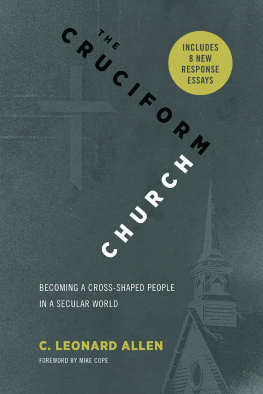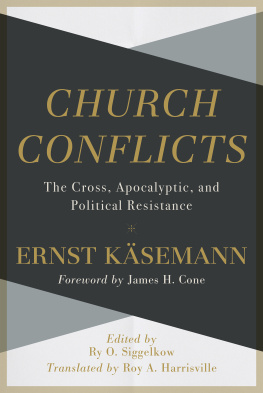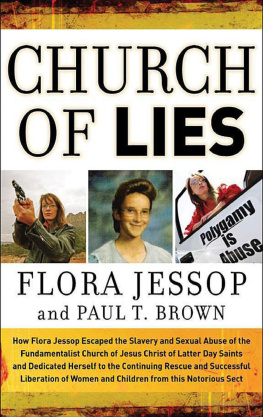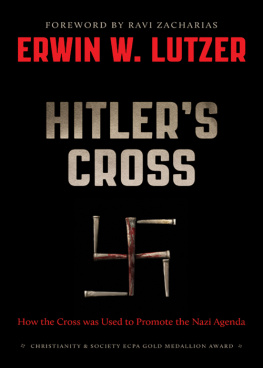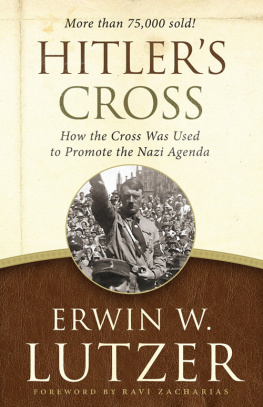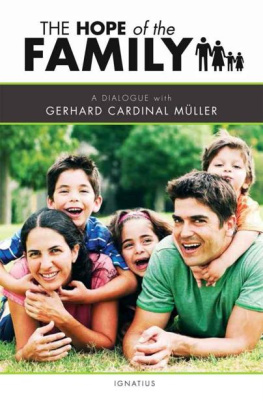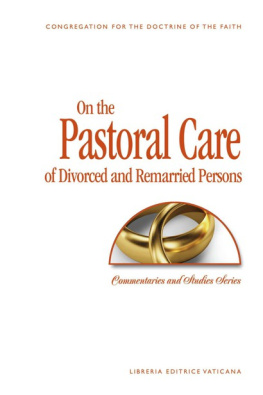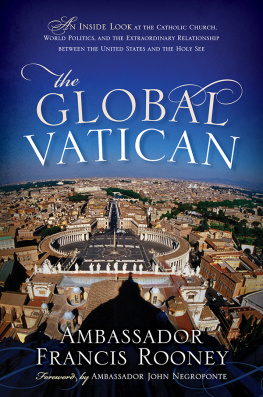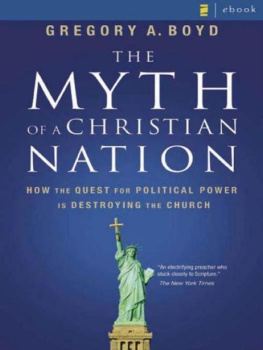Also by CARLENE CROSS
The Undying West: A Chronicle of Montanas Camas Prairie
Fleeing Fundamentalism
A Ministers Wife
Examines Faith
BY
Carlene Cross

Algonquin Books of Chapel Hill
Published by
ALGONQUIN BOOKS OF CHAPEL HILL
Post Office Box 2225
Chapel Hill, North Carolina 27515-2225
a division of
WORKMAN PUBLISHING
225 Varick Street
New York, New York 10014
2006 by Carlene Cross. All rights reserved.
Library of Congress Cataloging-in-Publication Data is available.
E-book ISBN 978-1-61620-294-1
All the events in Fleeing Fundamentalism are true. Only the names have been changed.
Contents
Preface
AT THE DAWN of the twenty-first century, religious Fundamentalism has emerged as one of the most powerful forces at work in America. Contesting modern secular values, it threatens scientific advances such as stem cell research, the separation of church and state, and the civil liberties of many. Yet for all its visibility, the Religious Right remains incomprehensible to a large number of people.
For years, as a ministers wife in the Fundamentalist movement, I embraced its ideologyone that measured all moral choice against the dictates of an error-free Bible and then set out to force that intrepretation upon America. Fleeing Fundamentalism is the story of my conversion as a child to this often airtight system, as well as my later escape, taking my own children with me. Alongside my story, I have tried to show how and why Fundamentalist groups came into existence, and what motivates their startling and troubling worldview.
In telling my story, I hope to examine this modern phenomenon and challenge its notions, those both individually inhumane and universally grandiose. I hope to remind people of the warning Thomas Jefferson gave us: that when government teams up with religion, it creates a formidable engine against the civil rights of man.
The Religious Rights biblical creed translates into a frightening sacrifice of societal and personal freedom. Nationally, this loss of liberty is encroaching upon our political system. Privately, it is being played out between individuals and families in homes across America. Fleeing Fundamentalism is one such story.
One
The Farm
I WAS SEVENTEEN on the day my destiny came to claim me. That evening in 1975, I sat in the kitchen of our old farmhouse and listened to the rainsquall move over the Rockies and into our valley. I felt the air grow heavy and oppressive, almost purple, as off to the east leaped platinum branches of lightning, momentarily suspended in silence until thunder shook the windowpanes with a great crash. A second lightning bolt flickered in the alfalfa field outside, illuminating the page open before me: And I stood upon the sand of the sea, and saw a beast rise up out of the sea, having seven heads and ten horns, and upon his horns ten crowns, and upon his heads the name of blasphemy.
I looked up as torrents of water slammed against the windows like buckets of silver paint, and I imagined the awful Beast of Revelation rising out of the firmament, his seven heads leering toward the shore. Twisted bone like rams horn grew from each skull, and every mouth gave the roar of an enraged lion, his huge yellowed canines gleaming in the moonlight. His bellowing heads swept from side to side, sending a fearsome echo through the mountains, and pendant loops of slaver whipping the air. I pictured the Devil standing on the white beach calling out to the creature at sea, I give you authority over all tribes, tongues, and nations. Everyone whose name is not written in the Book of Life will follow you.
I will burn my mark into their foreheads, the Beast screamed back. No one will buy or sell without it.
Six six six, Satan cried, with a howling laugh.
Closing Moms Bible, I shivered as goose bumps sprang up on my arms. How, I wondered, were Satan and his hideous Beast planning to sear 666 into peoples skins? Would they be like the calves we branded in the spring, bawling pitifully as the white smoke and the stench of burning animal flesh filled the sky? I could just see the heavenly angels of Revelation crying, Woe to the inhabitants of the Earth, as they opened the scrolls of judgment, releasing hail and fire down upon mankind, and locusts and scorpions to torment all who were left behind. I thought about the desperate future of the world and how Mom said that Jesus was coming back to rapture all the faithful Christians to heaven and leave all the unsaved behind to live through the Great Tribulation and wear the Beasts brand. It was in that moment that I stepped from the pathway of my normal life and detoured into another worldthat of serving God rather than indulging my own sinful flesh, which, until that instant, I had always been happy to do.
IN THE YEARS before this epiphany, I grew up in a farmhouse at the far corner of a valley in a far corner of Montana, itself a far corner of the world. Who could tell why I was embarrassed to be from the country, so unlike the seemingly contented folks around me? While others confined their dreams to the Sears catalog, I squandered long winter evenings in front of the crackling fire, dreaming about the outside world, where fine folks shopped in grand department stores and slick-shoed salesmen with immaculate fingernails asked if they might be of some assistance. I had been cheated. I knew that everything in the city was exciting, even thrilling, because I saw the evidence every night on the CBS Evening News with Walter Cronkite, or in the glossy magazines I pored over in the back of the school library.
I was mesmerized by the modern world, and the only place within less than two days drive that it could be found was in the pages of McCalls, Life, Look, and Harpers. Thankfully, these treasures were kept in the librarys alcove, where a person could find some privacy and dream uninterrupted about becoming as beautiful as movie star Faye Dunaway or skating heroine Peggy Fleming.
These magazines never came to our house. We got only the pictureless, brown-papered Farmers Journal, which detailed some boring new farm bill Senator Mansfield had introduced to Congress. I knew that people in New York debated sophisticated notions like high fashion and romance; they never worried about the depressed future of livestock. Instead of boots caked with cow manure, they wore gleaming cordovan Florsheims and rode up the elevators of sparkling glass skyscrapers that looked out across endless miles of a tempestuous sea. Back here on the farm, people kept both feetand their imaginationsfirmly planted on the ground. But in the city people were masters of their own destinies.
In the January 5, 1968, issue of Life, I read about a confident actress named Katharine Hepburn, who never let anyone tell her what to do. When Ms. Hepburn was acting in Guess Whos Coming to Dinner? she had the guts to tell Stanley Kramer, the director, how to perform his job. It made him pretty mad, but he forgave her, and they won two Oscars for the movie that year. I wanted to be like Katharine Hepburn, self-assured and wittynot plain and coarse like the people who lived in my stifling world, people who didnt enunciate their words or finish their sentences.
Our kitchen table collected these characters like hogs collect lice. On winter afternoons when northers rolled down from Canada, chilling the valley so fast you could watch the mercury fall, my father and his friends gathered in our kitchen to tell stories. They would come in from the blizzard, fumbling out of their leather jackets and stomping the snow from their boots, while the blaze in the river-rock fireplace spread its heat throughout the house. Mom moved quietly through the kitchen, plugging in the percolator and putting huckleberry pie in the oven. As the smell of warm berries and tamarack fir scented the room, the grown-ups hardly noticed my skinny frame, wedged into the corner. There I fantasized that I was a visiting anthropologist recently arrived to study the language and ways of a primitive tribe. I knew I could gather all I needed to understand them from the stories they were about to tell. Anecdotes forged in raw, abbreviated sentencesthe bones of a tale without a morsel of flesh.
Next page

